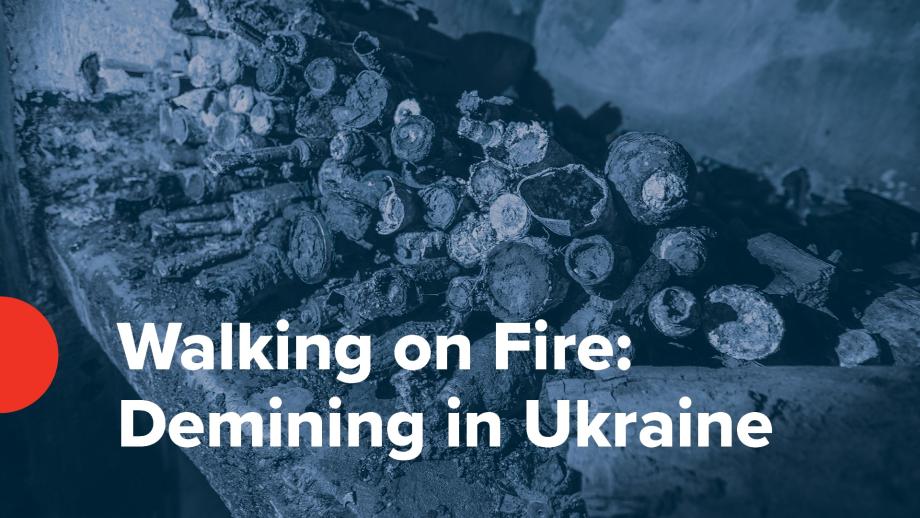Walking on Fire: Demining in Ukraine

Kyiv, 27 April 2023: Nearly five million hectares of agricultural land are currently unsuitable for use in Ukraine due to mines, contamination with explosive ordnance, or armed hostilities, a new GLOBSEC research finds.
With 174 000 sq.km of potentially contaminated territories as of April 2023, Ukraine has become one of the most contaminated countries in the world and currently faces enormous challenges in clearing its territory from mines and unexploded ordnance. The actual size of the contaminated territory requiring clearing is still difficult to assess as fighting persists. To date the Kharkiv and Kherson regions remain the most contaminated regions of all the liberated territories.
“It has been observed that the Russians have also deliberately targeted farming areas and agricultural land for contamination to render it impossible to use for economic activity. As a result of Russia’s invasion, nearly five million hectares or 50 000 sq.km of agricultural land are currently unsuitable for use in Ukraine due to mines, contamination with explosive ordnance or armed hostilities. Some estimate that land area of grain crops could be reduced by 45% after two years of war,” commented Iullia Osmolovska, Director of the GLOBSEC Kyiv Office and author of the report.
Having engaged in demining activities throughout its eastern territories since 2014, Ukraine has acquired the necessary expertise and skills to perform this specialized work. It has also enabled the establishment of an initial coordination system among Ukrainian authorities and mine-clearance experts. However, a proper structure and strategy for demining has not yet been developed. Currently, Ukraine’s toolbox of demining equipment remains in its early development stage and does not match its current needs, “There is an acute requirement for assistance from Ukraine’s partners in clearance (including survey and land release); mine risk reduction; victims’ assistance; advocacy; stockpile reduction,” Osmolovska explained.
With a war-torn economy, and confronted by so many diverse policy challenges, Ukraine is very much reliant on international assistance from donors to live day to day. This reliance extends to demining, which is exclusively tied to international assistance. Looking to the future, Ukraine will find it extremely difficult to allocate USD 3.7 billion annually for demining from its own budget. For 2023 alone, the World Bank has estimated needs of more than USD 397 million, for which Ukraine has already attracted only USD 16 million of international technical assistance and secured preliminary agreements on another USD 73 million.
More about this topic, including new data sets, can be found in GLOBSEC’s latest report "Walking on Fire: Demining in Ukraine".
About GLOBSEC:
GLOBSEC is a global think-tank based in Bratislava committed to enhancing security, prosperity and sustainability in Europe and throughout the world. It is an independent, non-partisan, non-governmental organisation. With its presence in Bratislava, Brussels, Kyiv, Vienna, and Washington, GLOBSEC’s mission is to influence the future by generating new ideas and solutions for a better and safer world. To this goal contributes the annual GLOBSEC Bratislava Forum, one of the leading global security conferences. GLOBSEC also organises the annual GLOBSEC Tatra Summit, a conference that provides the opportunity for experts to have fruitful political discussions on the future of Europe.
For media inquiries, please contact Henrieta Kunova who can be reached at [email protected]